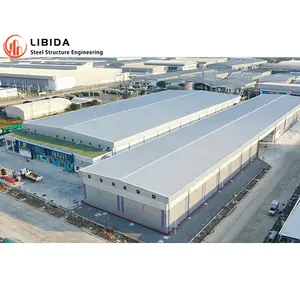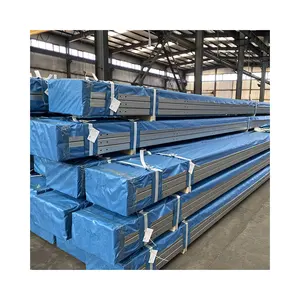
High Quality Color Coated Prepainted Roof Steel Corrugated Metal Plate Sheet Roofing Building Materials For Construction

China Design wide span Prefabricated Warehouse Metal Construction Building Steel Structure warehouse metal building materials




















Metal building materials are essential components used in the construction industry, catering to various applications ranging from structural supports to aesthetic enhancements in buildings. These materials are known for their strength, durability, and versatility, making them suitable for an array of construction projects such as office buildings, warehouses, hotels, and more. They include a variety of metals like steel, aluminum, and galvanized steel, each offering unique benefits that cater to the specific needs of construction professionals and developers.
The principle behind metal building materials is simple: they provide a robust and often cost-effective solution for creating structures that can withstand environmental stressors like weather, wear and tear, and even seismic activity. These materials come in different forms such as beams, sheets, studs, and tiles, each serving a specific function within the construction process. For instance, metal roofing tiles offer protection against harsh weather while steel beams provide the necessary support for large-scale buildings.
Metal building materials work by forming the skeleton or shell of a structure. They are engineered to meet strict standards for safety and performance. The manufacturing process often involves treatments such as galvanization or coating to enhance resistance against corrosion and increase longevity. Furthermore, these materials can be customized to fit the unique specifications of a project through services like cutting, welding, bending, and punching.
In the realm of construction, a vast array of metal building materials is available to meet the diverse requirements of various projects. Each type has its own set of common use cases:
Galvanized Steel: This material is steel that has been coated with a layer of zinc to prevent rusting. It's commonly used in environments where corrosion resistance is necessary. Its applications include roofing sheets, framing for walls and ceilings in drywall systems, and ductwork.
Stainless Steel: Known for its resistance to corrosion and staining, stainless steel is often used in areas where both the strength of steel and resistance to the elements are required. It is frequently seen in support structures within commercial kitchens, hospitals, and other environments that demand cleanliness.
Aluminum Alloy: Lightweight yet strong, aluminum alloy is favored for its malleability and rust resistance. It's typically used in façade cladding, window frames, and other architectural elements where aesthetic appeal is important alongside durability.
Carbon Steel: This material is predominantly used when high strength is needed at a lower cost compared to other metals. Carbon steel finds its application in structural components such as beams and columns in buildings.
Metal Core Materials: Such as rock wool cores are used in composite panels for insulation purposes. They provide excellent thermal and acoustic properties while adding fire resistance to walls and roofs.
Choosing the right metal building materials involves considering several factors that will ensure the material meets the needs of your project while providing durability and cost-effectiveness. Here are some considerations businesses should keep in mind:
Application: Consider the intended use—whether it's for structural support or aesthetic purposes—as different materials offer varying levels of strength, flexibility, and appearance.
Environment: Assess the environmental conditions such as exposure to moisture or chemicals that could influence corrosion resistance requirements.
Design Style: Match the material with the architectural design style you're aiming for; modern designs may call for sleek stainless steel finishes while traditional styles may benefit from the rustic look of galvanized steel.
Surface Treatment: Depending on the application, select materials with appropriate surface treatments like color coatings or polish that can enhance durability or visual appeal.
Processing Service Needs: Identify if your project requires additional processing services such as cutting or bending which can be crucial in customizing materials to specific dimensions or shapes.
Alibaba.com stands out as an expansive marketplace for wholesale metal building materials that caters exclusively to businesses around the globe. With a vast selection from over 200,000 suppliers listing products across nearly 5,900 categories—including an array of metal building materials—it's an ideal platform for businesses seeking quality construction components. The broad range available ensures that whether you're constructing a luxurious hotel or an efficient warehouse space, you'll find materials that align with your needs.
The platform simplifies international trade by offering tools that facilitate communication in local languages and mobile-friendly features for convenience on-the-go. Furthermore, Alibaba.com's Trade Assurance service provides peace of mind by securing payments until delivery completion—a testament to their commitment to transaction security. Such measures ensure that buyers can trust in receiving dependable materials critical for their construction projects without undue risk.
Moreover, Alibaba.com helps small to medium-sized enterprises (SMEs) navigate global markets by providing tailored trade solutions designed to streamline procurement processes. By connecting buyers with suppliers who offer customizable options—whether it's specific colors or tailored dimensions—businesses can source metal building materials that perfectly fit their project specifications without compromising on quality or efficiency.
Metal building materials offer durability, strength, and resistance to environmental factors like corrosion and fire. They are also versatile and can be used in various types of construction projects.
The choice of metal depends on the specific requirements of your project, such as the environmental conditions, structural demands, desired aesthetic, and budget constraints.
Yes, many metal building materials can be customized through processing services like cutting, bending, welding, and punching to meet the exact specifications of your project.
Certain metals like aluminum are recyclable and considered more eco-friendly. Additionally, some suppliers offer materials with lower environmental impact through sustainable manufacturing processes.
Metal building materials provide essential support and strength to a structure's framework, ensuring that it can withstand loads and stresses over its lifespan.
For outdoor applications, consider materials with high resistance to weathering, UV exposure, and corrosion. Surface treatments like galvanizing or coating can enhance outdoor performance.
Galvanized steel is used in applications that require corrosion resistance, such as roofing sheets, framing for walls and ceilings in drywall systems, and ductwork.
Stainless steel offers higher corrosion resistance than carbon steel and is often chosen for its aesthetic appeal in visible structural elements or in environments that demand cleanliness.
Surface treatments like galvanizing, polishing, or color coating can improve a material's resistance to corrosion and wear while also providing an attractive finish suitable for certain design styles.
Hot rolled techniques are typically used when dimensional precision is less critical, while cold rolled techniques provide a higher level of precision and a smoother finish for more detailed work.
Alloy composition determines the material's properties such as strength, flexibility, workability, and resistance to corrosion or heat. It is crucial to match the alloy composition to the specific demands of the application.
Yes, certain metals such as steel have natural fire-resistant properties. Additionally, composite panels with metal cores like rock wool can provide enhanced fire resistance.
When selecting metal roofing materials, consider factors like weight, durability, thermal performance, noise insulation, aesthetic requirements, and compatibility with the existing structure.
Aside from aesthetic considerations, color can affect heat absorption and reflection properties. Lighter colors generally reflect more sunlight and may contribute to energy efficiency in certain climates.